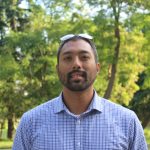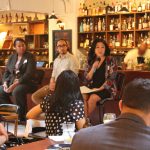OP-ED CONTRIBUTOR | January 18, 2018
By Flordelrio Correa
Martinez Fellow and Teacher
I can still recall my first day of kindergarten. The floors freshly waxed, mixing with the smell of drying paint from the back-to-school banners, and the ubiquitous scent of freshly sharpened pencils. You know, that “school” smell.
I was a child of the 90’s, growing up and maturing during the adolescence of the internet and the introduction of the millennials. But unlike the hyper-communication the internet provides now, and the independent thinkers millennials are helping us be, I grew up in an almost perfunctory dark age – a time when our “newness” had a tinge of stale nostalgia and bitter existentialism.
There was nothing deep about cultural relevance or understanding during the times I grew up. The color line across the city was still a living thing. It spread across Seattle like wax dripping from a multi-colored candle, dividing us up according to color, class, and communication. And the classrooms, they were no different.
I lived in a very small bubble on the South Side of Seattle in a neighborhood called South Park. My father is a small-business owner there and has always instilled in me the love of learning. He was by my side on my first day of school and many other first days, guiding me down my own path towards education.
My father grew up as a migrant worker. School was a privilege for the “off” season when he and his siblings weren’t picking produce. School for him was mixed – if he spoke his home language, he would be publicly humiliated and chastised with a rap across the knuckles from an educated teacher. My father began to understand something that I could feel but could not name until I was in my Master’s in Teaching program at the University of Washington in 2008.
“Not everyone has equal access to quality education. And, not every teacher believes that all children deserve a quality education.”
Here’s the secret: not everyone has equal access to quality education. And, not every teacher believes that all children deserve a quality education. In fact, not all teachers believe in their students.
That may be a rough sentiment to read, and it may be an unfair assumption to make. But how about this, how about we consider the actual young people for whom this is reality? The youths who get kicked out of class for “talking too much” or for “talking back to the teacher” – whatever that sounded like that day. What do we do to defend these students against the implicit bias of an educated adult? Who was there to protect my father?
This is why we need more teachers of color – more teachers who have lived, experienced, and have survived childhood trauma.
“The challenges we face here are those “tough conversations” that some teachers #“cant even” deal with.”
I work at an alternative school in Seattle called Interagency Academy. I have worked here all five years of my teaching career. The students at Interagency represent that cross-section of Seattle in which we see the discarded and the disillusioned. These students were expelled, suspended, kicked out, or just stopped doing the school thing for a while and the challenges we face here are those “tough conversations” that some teachers #“cant even” deal with. Race, culture, class, all of these are always at the forefront of every decision we make. We do not have the space, time or luxury to leave these conversations for later. This is truly and literally a life and death situation for some of these kids. And to that, I take seriously.
The challenges that come with these stakes is, “how do you simply leave work at home?” Aside from the lesson planning and organization that goes into your actual content, how are we safeguarding ourselves against the secondary trauma we experience by listening to our students? By surviving the day right alongside them?
Being a woman of color who teaches English Language Arts, I have always been regarded as the “exception to the rule” of English as a second language Latina. Sometimes the prejudices of the adults around me cause me to question their own authenticity with our students in general, especially our students of color. If as an educated adult who knows they are working with diverse students you have not sought out professional development that supports culturally responsive teaching, then what are you doing to help and how are you not hurting your students?
In order to encourage the next generation, we must have a vision. Teachers of color, it is not your sole responsibility to educate white teachers. It is not your call-to-action to try and authenticate cultural relevance for someone else. Please do not waste your energy trying to do this. Instead, we can help facilitate change by learning more about who we are in the classroom and what we represent to our students. Educate yourself on trauma sensitive practices. Address and reflect on your implicit bias. Take an improv class.
In order to provide more access points to education for all students (a way to close the opportunity gap) we have to start by educating ourselves.



